 |
An easy, flexible, 30-minute musical play for grades 2-6. Comes with the script, audio recording (with both a vocal and instrumental version of each song), and a teacher's guide. No music or drama experience needed! |
 |
✓ Funny script ✓ Catchy tunes ✓ Flexible casting ✓ Dumb jokes
Guitar-playing Ben Franklin and a cast of galvanizing characters teach about the discovery and applications of electricity. Learn more! |
Musical Play: “It’s Electrifying”
Complete Script & Audio: $45 (other items also available)

Synopsis
This show is designed to complement your unit on electricity and magnetism. Historical figures such as Ben Franklin and Thomas Edison guide students through such topics as how electricity was "discovered," how it travels, different forms of production of electricity, and conduction.
Preview the script and songs!Key Concepts
It’s Electrifying! is a great complement to your curriculum resources in elementary school science. And, like all of our plays, this show can be used to improve reading, vocabulary, reading comprehension, performance and music skills, class camaraderie and teamwork, and numerous social skills (read about it!) -- all while enabling students to be part of a truly fun and creative experience they will never forget!
Aligned with national standards! View the standards and vocabulary.Publication Info
Author: Ron Fink (Composer) and John Heath (Book and Lyrics)
ISBN:
978-1-886588-33-2
© 2005
Bad Wolf Press, LLC
3 reviews for Musical Play: “It’s Electrifying”
You must be logged in to post a review.
The Show
We want you to know what you're getting, so the cast list and first third of the script are available here! Bad Wolf shows are written for flexibility and can be edited however you like to meet the needs of your actors, school, curriculum, parents, astrological chart, latest whim, etc. If you have questions about the portions of the script not shown, please contact us.
Casting
Flexible casting from 11-40 students. Use as many Electrons, Capacitors, Televisions, etc. as desired. Actors can easily play several roles, or a single role can be divided between multiple actors. All parts can be played by any gender.
CHARACTERS:
Narrators (at least three)
Ben Franklin
Student Soloist
Cynthia
Thales
Electrons
Capacitors
Volta Fan Club
Leader of Club
Electromagnets
Televisions
Sun
Bankers
and a CHORUS comprised of all students who are not playing roles on stage
at the time
Script
This is the first one-third of the script.
(There is a string attached to a kite (or a picture of kite) on the backdrop. The CLASS is on stage. The NARRATORS step out, approach and address the audience.)
NARRATOR #1: Welcome to our story about electricity. We’re very excited about it.
NARRATOR #2: To get us started, we’ve invited Benjamin Franklin to re-enact his famous kite and lightning experiment.
NARRATOR #3: There’s all kinds of things about that story I’ve always wondered about. Like—why did he need all that electricity in the first place?
(BENJAMIN FRANKLIN enters with an electric guitar strapped around his neck. He walks across the stage, picks up the end of the string from the kite and plugs it into his guitar. He faces the audience, plays big chord, and the CLASS sings. He continues to play guitar throughout the song.)
Song 1
CLASS:
We’re feeling acrobatic
We’re waxing operatic
Just learning ’bout the static
Charges from our comb
We’re charged up we’re not lying
Our circuits keep on frying
Yeah it’s electrifying
We love our ohm sweet ohm.
Amps and joules
Watts and volts
Sparks and arcs
And lots of jolts.
It’s electrifying
It’s electrifying
It’s electrifying
Woh-oh-oh-oh.
(The following lines are chanted by one student, although different individual students may chant each line)
STUDENT:
It's true we love to shuffle both our feet across the rug
And then we give our brother such a nice big hug.
To do good science someone usually has to take his lumps
It's absolutely shocking just how high he jumps.
CLASS:
We got some great instruction
We’re current on conduction
And how ’lectric production
Affects us in our home
We’re charged up we’re not lying
Our circuits keep on frying
Yeah it’s electrifying
We love our ohm sweet ohm.
Amps and joules
Watts and volts
Sparks and arcs
And lots of jolts.
It’s electrifying
It’s electrifying
It’s electrifying
Woh-oh-oh-oh.
(FRANKLIN exits.)
NARRATOR #1: To be honest, that never really happened.
NARRATOR #3: You mean Ben Franklin didn’t play electric guitar?
NARRATOR #1: No, he didn’t.
NARRATOR #3: Electric keyboard?
NARRATOR #1: No.
NARRATOR #3: Drums?
NARRATOR #1: NO!
NARRATOR #2: But he did do really important experiments with electricity, and he did use the kite to show that lightning is a form of electricity.
NARRATOR #3: (pointing to audience)
So we’ve lied to these people already?
NARRATOR #1: It’s not lying. In the theater we call it “dramatic license.”
NARRATOR #3: The theater? I thought we worked in a power plant.
NARRATOR #2: We DO. But we’re always being asked about electricity, so we put together this little musical to inform the public.
NARRATOR #3: Oh. So these people aren’t actually in our power plant.
NARRATOR #1: No. They’re the audience.
NARRATOR #3: The audience? You mean they paid to see us put on this show?
NARRATOR #2: Actually, they got in free.
NARRATOR #3: Free! Well, come on, let’s give them their money’s worth. What happens next?
NARRATOR #1: Let’s watch a demonstration of how the existence of electricity was first discovered. Way back in ancient Greece.
(CYNTHIA and THALES enter. CYNTHIA holds a rock and a piece of cloth. )
NARRATOR #3: Wow! Are those guys really from ancient Greece?
(NARRATORS # 1 and #2 give #3 a dirty look)
Oh yeah, right. Dramatic license.
CYNTHIA: Hey Thales, check this out.
THALES: What is it, Cynthia?
CYNTHIA: If you rub this piece of amber with a piece of wool, it can pick up stuff.
THALES: Like what?
CYNTHIA: Like feathers and little sticks and fuzz balls.
THALES: That’s fantastic.
CYNTHIA: Isn’t it? It’s my latest discovery. I call it…the vacuum cleaner.
THALES: Can I try?
CYNTHIA: Sure.
(THALES rubs it. Suddenly jumps back.)
THALES: Did you see that?
CYNTHIA: What?
THALES: It gave off a little flash of light.
CYNTHIA: Really? Let me see.
THALES: No. I want to rub it some more.
CYNTHIA: It’s MY rock. Give it to me.
THALES: But I LOVE this rock.
CYNTHIA: NOW!
THALES: Okay, okay.
CYNTHIA (rubbing the rock, then): Wow, it’s does give off a spark!
Song 2
THALES and CYNTHIA:
There is a spark
There’s a spark in the dark
There’s a spark in the dark when I rub this amber
And if I buff
If I buff it enough
If I buff it enough I can make it pop.
There is a spark in the dark
There is a spark in the dark
Why it is so
Why it’s so I don’t know
Why it’s so I don’t know but I can’t I can’t
seem to stop.
It’s thrilling and it’s frightening
Making my own lightning
It glimmers and it crackles
Tickling my hackles
I have great powers
I’ve been doing this for hours!
There is a spark
There’s a spark in the dark
here’s a spark in the dark when I rub this amber
And if I buff
If I buff it enough
If I buff it enough I can make it pop.
There is a spark in the dark
There is a spark in the dark
Why it is so
Why it’s so I don’t know
Why it’s so I don’t know but I can’t I can’t
seem to stop.
(THEY exit)
NARRATOR #3: So they didn’t know about electrons in ancient Greece?
NARRATOR #2: No.
NARRATOR #3: Then how did they make their TVs?
NARRATOR #1: They didn’t have TVs!
NARRATOR #3: No TVs!? You mean no _____? No _____?
No ______? [Fill in blanks with the name of favorite TV shows, preferably
silly ones.]
NARRATOR #1: No.
NARRATOR #3 (in disgust): And they call themselves the cradle of Western civilization.
NARRATOR #2: The Greek word for amber is “electron,” so around 1600 when it came time to name the force that made things stick to objects like amber, they called it “electricity.”
NARRATOR #1: In the seventeenth century some really smart folks figured out that this mysterious thing called electricity moved, that it could really zip through certain materials.
(3 ELECTRONS run onto stage and all around, buzzing and zipping.)
NARRATOR #2: And here they are!
NARRATOR #3: Who?
ALL THREE ELECTRONS (stop running around and shout): We’re electrons!
ELECTRON #1: Put us in a good conductor and us mobile, “free” electrons can race along as electric current.
ALL THREE ELECTRONS: Free the electrons! Free the electrons!
ELECTRON #2: But if we’re in an insulator, there’s too much resistance and the electric current can’t flow.
ALL THREE ELECTRONS (with thumbs down): Resist the resistance! Resist the resistance!
ELECTRON #3: It’s all about conduction!
Song 3
ELECTRONS:
I like to move
Get down and groove
Go with the flow and have fun
I like to move
Get down and groove
Find a conductor and run.
I love good conductors
Like silver’s mighty fine
Give me something copper
And I’ll dance down the line.
I can zip through water
I will never tire
Iron can resist me
Yeah I’m a real live wire.
I like to move
Get down and groove
Go with the flow and have fun
I like to move
Get down and groove
Find a conductor and run.
I hate insulators
They try to box me in
Leather and ceramic
Won’t let me take a spin.
Porcelain and rubber
Feathers hair and glass
They put me in neutral
When I want to hit the gas.
I like to move
Get down and groove
Go with the flow and have fun
I like to move
Get down and groove
Find a conductor and run.
(THEY exit)
NARRATOR #1: Of course, it was a long time before people knew anything about electrons.
NARRATOR #2: But by the eighteenth century they had discovered all sorts of ways of rubbing and spinning things to make an electric charge. Now they needed a way to store an electric charge.
NARRATOR #3: That’s easy! I always keep an extra electric charge in my pants.
NARRATOR #1: You do not.
NARRATOR #3: Yes I do.
NARRATOR #2: No one can store electricity in his pants.
NARRATOR #3: Yes they can. Just a minute, let me look.
(She/he searches through pockets, and eventually finds a jar.)
See, here it is.
NARRATOR #1: And you have an electric charge in there?
NARRATOR #3: A big one. A giant one. Huge, even.
NARRATOR #2: Let me see that.
(She/he takes can. Opening it carefully, some of those springy snakes
bounce out.
NARRATOR #2 jumps in fright.)
That’s not funny. And it’s not electricity.
NARRATOR #3: Oh no? Then how come it gave you a shock?
(to audience)
I love that one. I got a million of them.
(hands out business card to audience members)
Here’s my card. I do birthdays, weddings, bar mitzvahs.
NARRATOR #1: Enough of that! What we’re talking about here are
capacitors or condensers. Things that keep an electric charge stored
up
and then release it when you want it.
(shouts to side)
Bring in the capacitors!
(CAPACITORS enter)
CAPACITOR #1: Here we are! And look how far we’ve come from the Leyden jar of the eighteenth century.
CAPACITOR #2: You bet. We’re sleek, smooth, and everywhere now, from washing machines to computers.
CAPACITOR #1: Oh yeah, baby, we’re charge-a-licious!
Song 4
CAPACITOR #1:
I’m a capacitor
I snatch and catch the juice
Oh whoa, oh whoa
And I will not let it loose.
CAPACITOR #2:
I’m a capacitor
And though I’m not so large
Oh whoa, oh whoa
And I can take a charge.
CAPACITORS:
Ben Franklin was quite odd
With his lightening rod
Set up to catch the lightening all around
But when he caught a bolt
He didn’t save one volt
But let it all escape into the ground.
(Spoken: Such a waste!)
We’re a capacitor
We’re ev’rywhere you are
In your appliances
And riding in your car.
We’re storing energy
Yeah that’s our claim to fame
Oh whoa, oh whoa
And farads are our game.
We really have come far
From that Leyden jar
That folks once used to store ’lectricity
Now in this modern age
Condensers are the rage
And there is nothing I would rather be.
(Spoken: Our mothers are so proud!)
I’m a capacitor
I snatch and catch the juice
Oh whoa, oh whoa
And I will not let it loose.
I’m a capacitor
And though I’m not so large
Oh whoa, oh whoa
And I can take a charge.
(THEY exit. VOLTA’s FAN CLUB enters.)
LEADER: Gather ’round, gather ’round. Welcome to the annual meeting of the Alessandro Volta fan club.
ALL: Volta, Volta, I’m your fan...Galvani isn’t half the man.
LEADER: Okay, settle down. It’s time for the reading of the scroll.
(Someone hands him a bowl.)
What’s this?
FAN CLUB MEMBER: It’s the bowl.
LEADER: Not the BOWL. The SCROLL! Where’s the scroll?
(Another FAN CLUB MEMBER hands the leader a scroll, which she/he unrolls and reads from it in a serious voice, one filled increasingly with emotion.)
FAN CLUB MEMBER: Let us now recall the dark days, the bleak days before 1800,the dim days when there was no way to produce a constant electric current.
MEMBERS: Whoa, whoa to the dark days.
FAN CLUB MEMBER: Then there came a man who put two different metal plates in salty water and lo, there was a mighty change. A powerful change. A chemical change!
MEMBERS: It was magic!
FAN CLUB MEMBER:(stops reading): Not magic, my friends, but anodes, cathodes, and electrolytes.
MEMBERS: It was magic!
LEADER: Close enough.
(continues reading)
From this chemistry he brought to us the cherished electric cell. And
cell to
cell did our brave Volta connect, cell upon cell did he heap. Until,
at last, he
produced the original…the unprecedented…the wonder of the
first practical
battery, called the Voltaic Pile.
MEMBERS: Hail the Voltaic Pile!
LEADER:. And so, my fellow Voltarians, as folk tales the world over now relate, the modern unit of electric potential was named after our beloved Volta.
MEMBERS: Volta! Volta! Volta!
LEADER: Now, sing with me.
Song 5
MEMBERS:
Who made the first electric cell?
Who made the current flow?
Who made the first real battery
Two hundred years ago?
Who worked with copper, lead, and tin?
Who figured out a way
To father all our batteries
From D to triple A?
Alessandro Volta
CLASS:
Volta, Volta, Volta!
MEMBERS:
He was sure no dolta
CLASS:
Dolta, dolta, dolta!
MEMBERS:
He made elect current run much faster than a colta
Alessandro Volta
He was sure no dolta
Next time you touch a battery and get a little jolta
Thank Alessandro Volta.
Whoever had his brilliant mind?
Whoever had his style?
Who wouldn’t give his foot to be
A nice Voltaic pile?
Who worked with copper, lead, and tin?
Who figured out a way
To father all our batteries
From D to triple A?
Alessandro Volta
CLASS:
Volta, Volta, Volta!
MEMBERS:
He was sure no dolta
CLASS:
Dolta, dolta, dolta!
MEMBERS:
He made elect current run much faster than a colta
Alessandro Volta
He was sure no dolta
Next time you touch a battery and get a little jolta
Thank Alessandro Volta.
(THEY exit)
(This concludes the first one-third of the script.)
The Songs
Click on any song to listen to a snippet. Click the cart icon to purchase any track for $1.
Standards
Common Core and Other National Standards
Science
History/Social Studies
Language Arts
- Common Core Reading Standards for Literature: 2nd, 3rd, 4th, 5th, 6th
- Common Core Reading Standards: Foundational Skills:
- 2nd: Phonics and Word Recognition
- Common Core Speaking and Listening Standards: Comprehension and Collaboration - 2nd, 3rd, 4th, 5th, 6th
- Common Core Language Standards: Vocabulary Acquisition and Use -2nd, 3rd, 4th, 5th, 6th
- Common Core Standard 10: Range, Quality & Complexity:
National Core Arts Standards
- Music - Anchor Standards 4-6
- Theater - Anchor Standards 3-6
- Dance - Anchor Standards 1-6
Vocabulary
Key Terms and Concepts
Ben Franklin
ohms
watts
electrons
farads
magnetism
Samuel Morse
Thomas Alva Edison
lightning
resistance
capacitors/condensers
battery
Marconi
Energy conservation
Electric Power Generation: coal, wind, gas, bio-mass, nuclear, solar,
geothermal, hydro
static charges
amps
volts
Leyden jar
Alessandro Volta
electro-magnets
Morse code
current
amber
anodes
cathodes
electrolytes
circuits
joules
power plant
"juice"
Galvani
telegraph
Alexander Graham Bell
conduction
insulator
Voltaic Pile
electric cell
electric potential
General Vocabulary
acrobatic
bar mitzvah
Industrial Revolution
closure
operatic
scroll
dramatic license
unprecedented
solar
hackles
cassava
guava
porcelain
bleak
weatherize



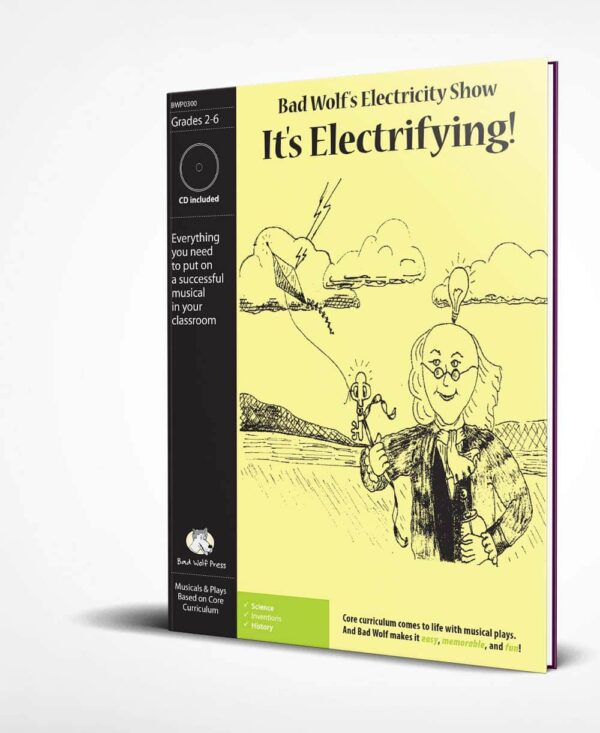
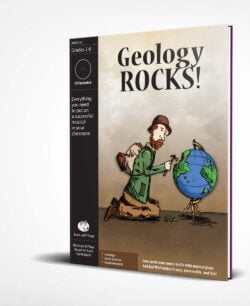
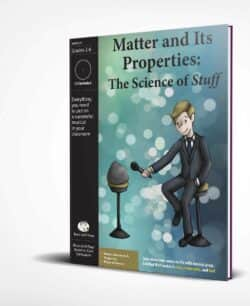
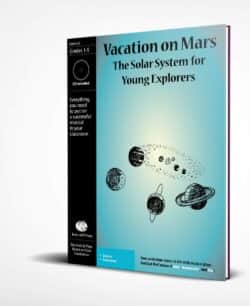
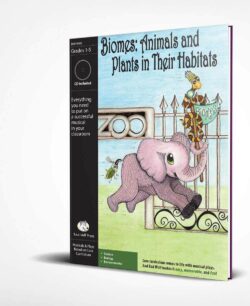

Celeste A Nava –
I just love this play, as do my students! The songs are so catchy, it’s easy for the children to learn them (and they learn so much content from singing them, too). The play is funny, and easily revised, if you choose to do that. I recommend Bad Wolf Press musical plays to anyone interested in adding joy and engagement to their classroom!!
Cecilia Zamora –
This play just like all the others I have used are great. The songs and the short dialogue are entertaining, as well as informational.
Bridget Siegel (verified owner) –
This was my first time putting on a play with my students, and we had a great time learning and rehearsing. The content bridges social studies with science, which is always an important aspect to any addition to curriculum. The parents enjoyed seeing how the students worked together to create something different!